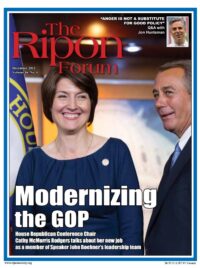
Coming off the heels of an embarrassing defeat on November 6th, Republicans find themselves at an important philosophical crossroads.
In one direction is the party’s longtime foundation of older white voters. In the other direction is the new emerging American majority – one where minorities have increasing influence and young people are refusing to be left behind.
As a 27-year old Republican, I am at a loss for how my party got to this point. I am also tired of being on the defensive when others in my generation ask how I can be a member of such an ideologically rigid and intellectually inconsistent political group. Yet, the numbers paint a picture that is impossible to ignore.
President Obama captured 60 percent of the youth vote this election, and an overwhelming majority of Latinos, Asians, and African Americans voted against the GOP. These individuals weren’t just voting against the Republican Party’s candidates. They were voting against the party’s positions on issues that were of importance to them. Indeed, from comprehensive immigration reform, to same-sex marriage, to legalized marijuana, to abortion, my generation sent a clear message to Republican leaders this election – namely, that the party needs to offer us more than low taxes to win our vote.
I am at a loss for how my party got to this point. I am also tired of being on the defensive when others in my generation ask how I can be a member of such an ideologically rigid and intellectually inconsistent political group.
The same can be said for Latino Americans. President Reagan once said: “Hispanics are already Republican, they just don’t know it.” If our party cannot craft a message that can articulate that, then we’ll continue to see repeat performances from this past election. Many of today’s Republican leaders fail to grasp that symbols are potent forces in American politics, and the GOP’s hard-line stance on immigration reform has become a symbol of the party’s hostility to this important and growing demographic group. A prominent Latino polling group reports, for example, that as many as 31 percent of those surveyed would be more likely to consider voting Republican if the party eased its position on this issue and helped pass legislation leading to an easier pathway for citizenship. A version of the DREAM Act recently introduced by Republicans Senators Jon Kyl, Kay Bailey Hutchison and John McCain is a step in the right direction. But it will be the political equivalent of a tree falling in the forest if the Republican Leadership doesn’t get behind this bill or a similar proposal.
A wave is sweeping across the country on these and other issues. For the first time, Washington, Maryland, and Maine all approved same-sex marriage by a popular vote. These states joined six others — New York, Connecticut, Iowa, Massachusetts, New Hampshire, Vermont — where same-sex marriage has already been made legal by a constitutional amendment. In another development, Colorado and Washington also became the first states to legalize the use of marijuana for recreational use.
While some Republicans are left puzzled by these developments and the electoral results as a whole, it is my hope that my party’s platform is amended to include those opinions and voices of my generation who refuse to be ignored. Without a reasonable attempt to meet non-white and young voters halfway on making logical changes to our nation’s immigration laws and a myriad of other social issues as well, I worry that I will be among the last of a dying breed of young, hopeful conservatives who once looked to the GOP as the party of reform.
Theodore Roosevelt once stated, “I was able to hold the Republican Party in power only because I insisted on a steady advance.” If the GOP is to maintain a “steady advance” into the future, then it must advance and pay heed to the message young and minority voters sent on November 6th.
The time for reform is upon us. The time to act is now.
Jarrad Hensley is the Deputy Editor of The Ripon Forum.




